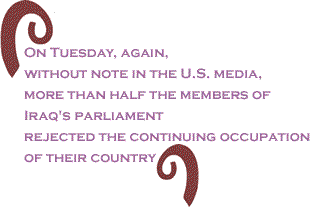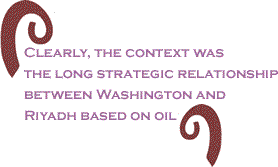
|
|||||||||||||||||||||
|
The current issue is always free to all readers If
you need the access available to a |
|
 |
|
Something really momentous took place inside Iraq’s Green Zone last week and if you’re looking for a full report on it in the U.S. major media save yourself the trouble. As far as they are concerned, the fact that over half of Iraq’s parliament joined in a call for setting a withdrawal date of the “coalition” force from their country, it was a non-event worthy of scant or belated mention. Likewise was the story of how the Senate in Afghanistan voted the same day to call for the exodus of the occupation forces from that country as well. Some major newspapers have yet to record that fact. On May 8, the Afghan Senate – the upper house of the Afghan parliament – resolved that the beleaguered country’s government should press for government, U.S. and NATO forces to halt the hunt for opposition Taliban fighters and other militants and enter into negotiations to end the fighting. “The motion comes at a time of rising public discontent with the government of President Hamid Karzai over civilian casualties at the hands of Western troops, corruption and the failure to turn billions of dollars in aid into better livelihoods,” reported Reuters. “On Tuesday, again, without note in the U.S. media, more than half the members of Iraq's parliament rejected the continuing occupation of their country,” wrote Raed Jarrar and Joshua Holland on AlterNet the next day, adding, “It's a hugely significant development. Lawmakers demanding an end to the occupation now have the upper hand in the Iraqi legislature for the first time. Previous attempts at a similar resolution fell just short of the 138 votes needed to pass (there are 275 members of the Iraqi parliament, but many have fled the country's civil conflict, and at times it's been difficult to arrive at a quorum).” “What is clear is that while the U.S. Congress dickers over timelines and benchmarks, Baghdad faces a major political showdown of its own,” wrote Jarrar and Holland. “The major schism in Iraqi politics is not between Sunni and Shia or supporters of the Iraqi government and "anti-government forces," nor is it a clash of "moderates" against "radicals"; the defining battle for Iraq at the political level today is between nationalists trying to hold the Iraqi state together and separatists backed, so far, by the United States and Britain.” “The continuing occupation of Iraq and the allocation of Iraq's resources - especially its massive oil and natural gas deposits - are the defining issues that now separate an increasingly restless bloc of nationalists in the Iraqi parliament from the administration of Iraqi Prime Minister Nouri al-Maliki, whose government is dominated by Shiite, Sunni and Kurdish separatists,” they continued.
“Iraq's separatists also oppose setting a timetable for ending the U.S. occupation, preferring the addition of more American troops to secure their regime. They favor privatizing Iraq’s oil and gas and decentralizing petroleum operations and revenue distribution.” “A sovereign and unified Iraq, free of sectarian violence, is what George Bush and Tony Blair claim they want most,” wrote Jarrar and Holland. “The most likely reason that the United States and Britain have rebuffed those Iraqi nationalists who share those goals is that the nationalists oppose permanent basing rights and the privatization of Iraq's oil sector. The administration, along with their allies in Big Oil, has pressed the Iraqi government to adopt an oil law that would give foreign multinationals a much higher rate of return than they enjoy in other major oil producing countries and would lock in their control over what George Bush called Iraq's ‘patrimony’ for decades.” One Iraqi parliamentarian told the AlterNet writers, “We're afraid the U.S. will make us pass this new oil law through intimidation and threatening. We don't want it to pass, and we know it'll make things worse, but we're afraid to rise up and block it, because we don't want to be bombed and arrested the next day.” “The coming weeks and months will be crucial to Iraq's future,” Jarrar and Holland observed. “The United States, in pushing for more aggressive moves against Iraqi nationalists and the passage of a final oil law, is playing a dangerous game. Iraqi nationalists reached in Baghdad this week say they are beginning to lose hope of achieving anything through the political process because both the Iraqi government and the occupation authorities are systematically bypassing the Iraqi parliament where they're in the majority. If they end up quitting the political process entirely, that will leave little choice but to oppose the occupation by violent means.” The Iraqi lawmakers’ effort to set a timetable for the withdrawal of the occupation forces is in sharp contrast to the efforts of representatives of the Maliki government, who traveled to Washington last week to try to convince the U.S. Congress not to.
The New York Times did get around to reporting the Iraqi parliament’s withdrawal proposal four days after it happened, on page six, in an article that appeared to play down it’s importance and included this dubious observation: “But in another respect the petition brings the majority of Iraqi legislators into agreement with the Bush administration: both argue that an American withdrawal should depend on the readiness of Iraqi troops.” Well, not exactly. Some observers have suggested that failure to pass the oil legislation might presage a decision in Washington to jettison the Maliki regime, setting the stage for some dramatic government change and prolonging the war indefinitely. Terming the Iraqi parliamentarians’ action “a sign of a growing division between Iraq's legislators and prime minister” Joshua Partlow wrote in the Washington Post (three days late) that, “The draft bill proposes a timeline for a gradual departure, much like what some U.S. Democratic lawmakers have demanded, and would require the Iraqi government to secure parliament's approval before any further extensions of the U.N. mandate for foreign troops in Iraq, which expires at the end of 2007.” "We haven't asked for the immediate withdrawal of multinational forces; we asked that we should build our security forces and make them qualified, and at that point there would be a withdrawal," Bahaa al-Araji, a member of parliament allied with the Shiite cleric Moqtada al-Sadr, whose supporters drafted the bill, told Partlow. "But no one can accept the occupation of his country." As if to underscore that it is the political and economic questions that are the most urgent, Mr. Oil himself showed up in Baghdad May 9 on what clearly was a head-banging mission. Vice President Cheney arrived to (in the words of the Post correspondent) “press the government to act quickly on a host of divisive political issues that the Bush administration deems threatening to long-term stability.” In Cheney’s words, he was in Baghdad to deal with "things like the Baghdad security plan, ongoing operations against the terrorists, as well as political and economic issues that are before the Iraqi government.”
The Vice-President made it clear that he has no intention of abandoning his tactic of linking the war to Al Qaeda - as he did in the run-up to the invasion. “This world can be messy and dangerous, but it’s a world made better by American power and American values,” he told the crew of an aircraft carrier in the Gulf. “Osama bin Laden and his lieutenants believe they can wear us down, break our will, force us out and make Iraq a safe haven for terror,” Mr. Cheney said. “They see Iraq as the center of a new caliphate, from which they can stir extremism and violence throughout the region, and eventually carry out devastating attacks against the United States and others. We are here, above all, because the terrorists who have declared war on America and other free nations have made Iraq the central front in that war,” Cheney told soldiers at a U.S. base near Tikrit. The problem with this is, of course, there was no link between Iraq and Al Qaeda before the war and hardly anybody believes the purpose of the occupation is to defeat the group. Cheney’s stop in Iraq was part of a tour around the region during which he conferred with leaders of Abu Dhabi, the United Arab Emirates, Saudi Arabia, Egypt and Jordan in an apparent effort to strike some kind of bargain that might dampen sectarian violence in Iraq while preserving what the Administration sees as U.S. interests. When the Vice-President met with Saudi King Abdullah, one of the most autocratic rulers in the region, we can be sure the last thing they talked about was “democracy.” Clearly, the context was the long strategic relationship between Washington and Riyadh based on oil. "I think on the whole, Saudi leadership is a very good thing, given the strength and enduring nature of our relationship with the Saudis and the amount of work and cooperation we've done over the years," an aide to Cheney said. “Certainly, Iraq was a catastrophic error of judgment,” wrote the editors of the Financial Times on May 11. “As well as breaking a state and dissolving a society, the invasion and occupation have created an incubator of terrorism far more dangerous than the Afghanistan of the Taliban, proliferated jihadi totalitarianism around the globe, and made the Islamic Republic of Iran the dominant power in the Middle East. Western and Sunni Arab panic at Shia Iran's advance has created a diplomatic vacuum and flung Mr. [British Prime Minister Tony] Blair's and George W. Bush's vaunted "freedom agenda" in the region (tough on terrorism, tough on the causes of terrorism) into headlong retreat.”
The May 8 actions of the parliaments of both Afghanistan and Iraq suggest that while the U.S. Congress debate conditions and prerequisites for withdrawal, and the Vice-President maneuvers over their heads and behind their back, after years of death and destruction, national patriots in both countries are finding voice to say to the occupiers: leave as quickly as possible. Meanwhile, in another indication of a surge in Iraqi nationalism and the class forces at work in that war-torn country, Iraqi oil workers prepared to strike May 14 to protest the oil privatization law the U.S. is determined to see passed. “The new oil law is a direct intervention in Iraq’s domestic policies. It will result in nothing more than increasing the Iraqi-Iraqi imposed violence, and the Iraqi-occupation fight,” writes Jarrar, an Iraq consultant to the American Friends Service Committee, on his blog Raed in the Middle. “The best oil law is the law that the Iraqis will choose after the last US soldier leaves, and the best and only policy that will end the violence in Iraq is setting a timetable that will end all the U.S. presence in Iraq completely, without permanent bases, and gives Iraqis the time and space to heal their wounds and rule their country.” BC Editorial Board member Carl Bloice is a writer in San Francisco, a member of the National Coordinating Committee of the Committees of Correspondence for Democracy and Socialism and formerly worked for a healthcare union. Click here to contact Mr. Bloice. |
|
| Home | |
| May
17, 2007 Issue 230 |
||||||||||||||
|
||||||||||||||
| Printer Friendly Version in resizeable plain text format | ||||||||||||||
|
|
||||||||||||||
 |
||||||||||||||
 |
||||||||||||||
 |
||||||||||||||
| |
||||||||||||||
| |
||||||||||||||





































